Wake Me When There Are Consequences
Things are happening every day, but nothing ever comes of it.

As a politician, Trump is a piece of saran wrap attempting to sheath a porcupine — transparent and utterly ineffectual. But as an expression of America, he is its culture realized: crass, loud, idiotic, and petulant. He leads the charge of democratizing information, rendering most of it useless. He is ennui incarnate — the sound and the fury, signifying nothing.
Do you subscribe to Leah Letter yet? This week it’s about how our dyspepsia has become the new normal and lately it’s gotten very boring. So boring in fact that the only real option for many has been going to sleep. Maybe you’ve read about depression naps, or anxiety sleeping? I know that many of you have trouble sleeping at night precisely because of the news, and it must feel very unfair that some of us just escape behind our eyelids. Personally I have always been an advocate of early bedtimes , if only because it means 1) less time in this stupid waking nightmare, and 2) you get to wake up long before Twitter gets interesting and that reminds you how stupid it is!
Look, I’m not saying everyone can do it—sleep is absolutely a luxury and a privilege. But wouldn’t it be nice to be in a deep sleep until they figure this whole thing out? My own personal solution to my ennui is usually to sleep, where at least I don’t have to think about it all, at least not actively, and I can wallow in the weird synapse flashes and buried desires that constitute my dreams. In one of the great episodes of “Sex and the City” (cameos from Wallace Shawn AND Kristen Johnston!), the last woman in New York who’s single, unmarried, and doing coke at parties announces to a room full of Upper East Siders, “I’m so bored I could die!”
That’s me, except I’m so bored I could go to sleep. Wake me when it’s over.
What a Pack of Cigarettes Costs, in Every State
The price of smoking in 2017
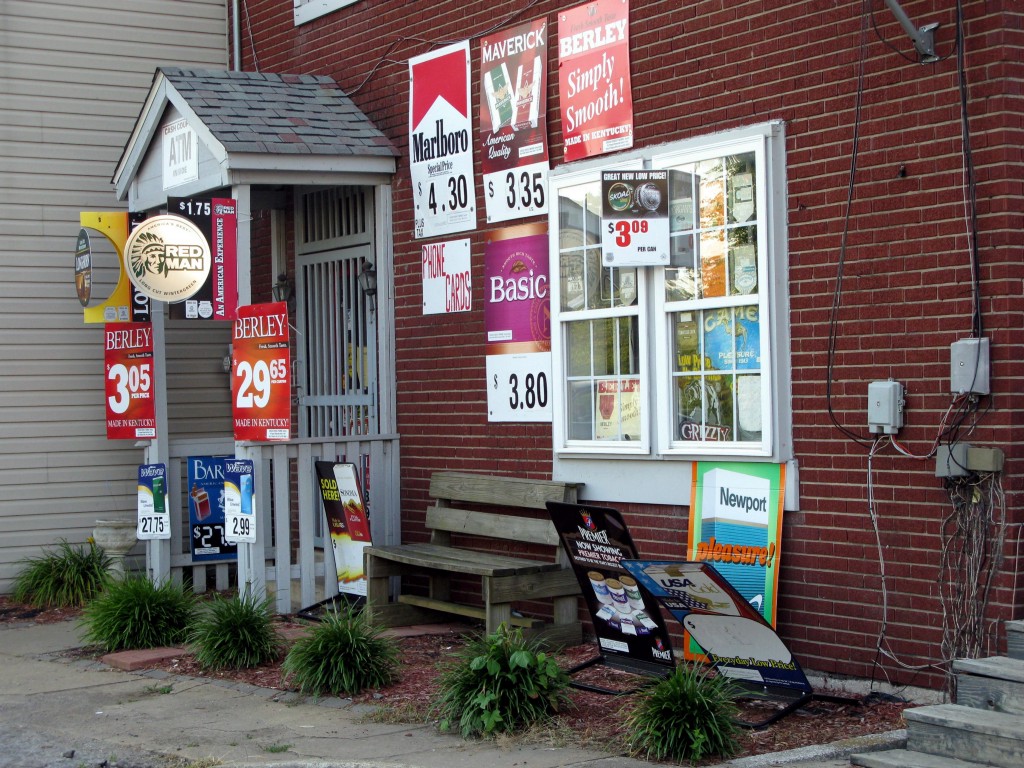
This summer marks the seventh year The Awl has conducted its (very thorough and scientific) study on the cost of smoking in America. As always, we called a random gas station or convenience store in each state’s most populous city and asked the price on a pack of Marlboro Reds, tax included. Mississippi has the cheapest cigarettes, North and South Carolina are tied at $6 (cute!), and New York remains — now and forever — the most expensive. Twenty people were unable to give prices over the phone this year and four people hung up on me. In Montana, a gas station attendant had me call him on his cell phone (“It’s piped straight into my hearing aid”) and discussed cigarette brands, before telling me he did not sell any.
2017 also marks the seventh year The Centers for Disease Control and Prevention (CDC) has tracked Teen Vaping. Teen smoking rates have been falling for years but, for the first time since 2011, the teen vaping rate fell as well. Congratulations, teens. Vaping is lame.

46. Kentucky ($5.19): $5.72 = +10%
45. North Dakota ($5.32): $5.79 = +9%
44. Idaho ($5.45): $5.87 = +8%
43. Tennessee ($5.28): $5.90 = +12%
42. Oklahoma ($6.04): $5.96 = -1%
41. Wyoming ($6.22): $5.96 = -4%
40. North Carolina ($5.81): $6 = +3%
tied with South Carolina ($6.34): $6 = -5%
39. Alabama ($5.62): $6.04 = +7%
38. Virginia ($6.31): $6.12 = -3%
37. Colorado ($6.31): $6.28 = -.5%
36. Indiana ($6.16): $6.41 = +4%
35. Iowa ($7.73): $6.42 = -17%
34. West Virginia ($5.89): $6.49 = +10%
33. Arkansas ($5.94): $6.69 = +13%
32. Florida ($5.57): $6.71 = +20%
31. Missouri ($5.40): $6.73 = +25%
30. Montana ($6.70): $6.78 = +1%
29. Oregon ($6.24): $6.79 = +9%
tied with New Hampshire ($6.90): $6.79 = -2%
28. Ohio ($6.01): $6.85 = +14%
27. Kansas ($7.83): $6.92 = -12%
26. Louisiana ($6.92): $7 = +1%
25. Georgia ($6.44): $7.02 = +9%
tied with South Dakota ($7.09): $7.02 = -1%
24. Nebraska ($7.01): $7.09 = +1%
23. Texas ($7.57): $7.14 = -6%
22. Michigan ($7.60): $7.25 = -5%
21. Delaware ($6.60): $7.49 = +13%
20. Maryland ($7): $7.58 = +8%
19. Utah ($6.84): $7.59 = +11%
tied with New Mexico ($7.37): $7.59 = +3%
18. Maine ($7.67): $7.86 = +2%
17. Nevada ($7.57): $8.19 = +8%
16. Arizona ($8.10): $8.21 = +1%
15. Wisconsin ($7.57): $8.46 = +12%
14. New Jersey ($8.37): $8.55 = +2%
13. Minnesota ($9.07): $9 = -1%
12. Washington D.C. ($8.15): $9.19 = +13%
11. Rhode Island ($10): $9.40 = -2%
10. Washington ($9.75): $9.56 = -2%
9. Hawaii ($5.35): $9.87 = +84%
8. Connecticut ($9.65): $10.09 = +5%
7. California ($7.16): $10.51 = +47%
6. Alaska ($10): $10.52 = +5%
5. Vermont ($10.43): $10.54 = +1%
4. Massachusetts ($10.67): $10.70 = +.5%
3. Pennsylvania ($9.50): $11.85 = +25%
2. Illinois ($11.26): $13.23 = +17%
1. New York ($12.60): $13.95 = +11%
Rebecca McCarthy is on Twitter
It's The Brands, Stupid
And there are no winners.
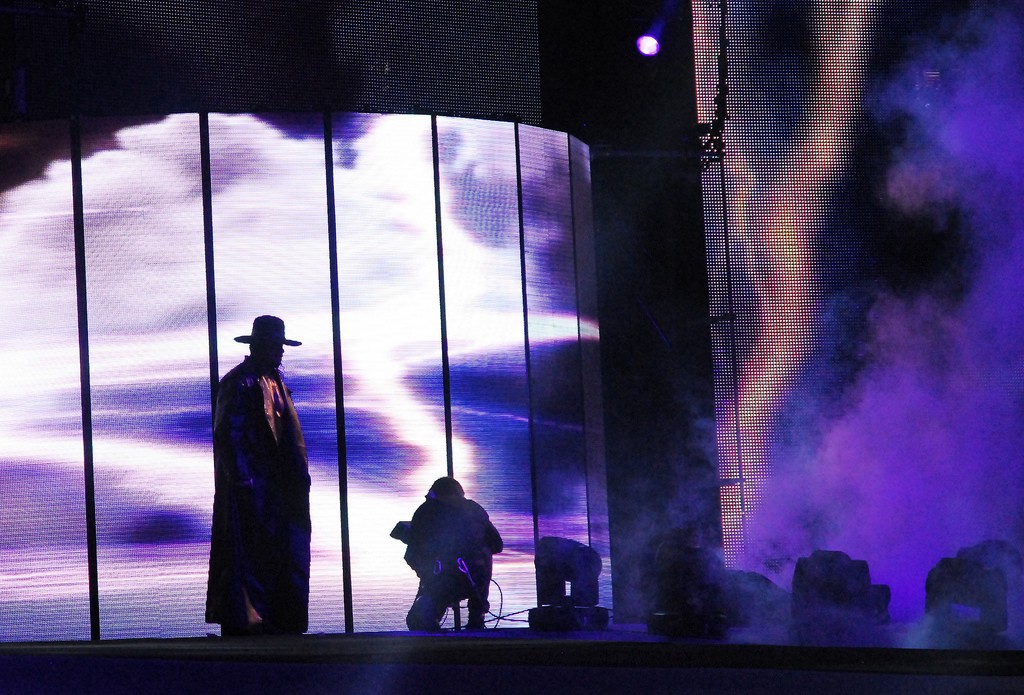
That’s right: the omni-pandering network that is today pleased to present itself as a noble defender of First Amendment freedoms gleefully enlisted a genuine journalist-bashing thug into its ranks of camera-ready commentators for the sake of enhancing its market share. What’s more, Lewandowski was still drawing a salary from the Trump campaign while he spouted Trumpist talking points in CNN’s Columbus Circle aerie — a first-order disqualifying conflict of interest for any news organization with the remotest interest in journalistic integrity.
Battle of the Brands | Chris Lehmann
Awl pal Chris Lehmann trains his “jaundiced eyeball” on the Trump-CNN debacle over at the Baffler—read the whole thing here.
Flabaire, "Alpha 2"
Are you ready to rock?
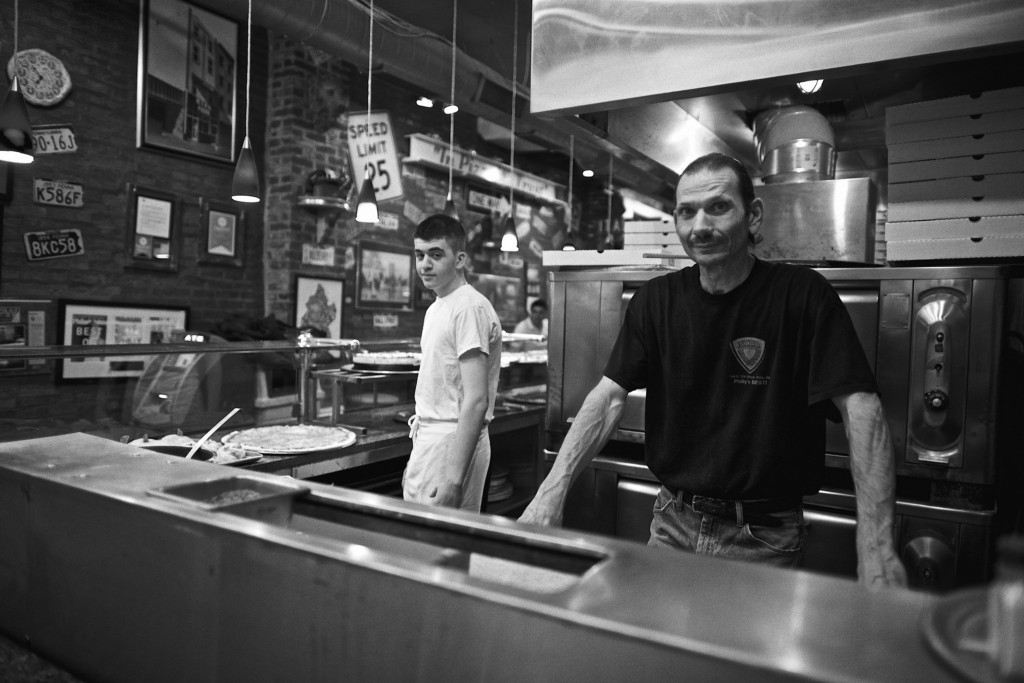
Now that the rock era is over — by my lights, the last rock record that really made a difference was The Cribs’ Men’s Needs, Women’s Needs, Whatever from 2007, which means we’ve had a decade to absorb the loss — maybe someone can investigate the most confounding question from that period, namely why did we put up with so many songs about being rock musicians? It is hard to think of anything less relatable — even novels that have novelists as their protagonists are easier to empathize with, since many of us live in Brooklyn, are Jewish, treat women badly, have an inflated sense of our own value or at least know someone with one or more of those characteristics — and yet some of the genre’s biggest hits are not only about being musicians but being extremely successful ones at that, and how incredibly burdensome it is to endure the lifestyle. Why on earth were we all like, “Yeah, I get it,” instead of. “Go fuck yourself, I have to ride a bus all the time too and it’s way worse”? I mean, I guess it’s not the most pressing concern we should worry over at present but if someone needs content — and given current trends every possible thing to write about will have both been written about and turned into fraudulent video by the end of the summer — it is a topic to explore. Anyway, here is some music that is in no way about being a rock star. Enjoy.
New York City, July 9, 2017

★★★★ Indoors was crabby and crowded and everyone was in such a mood it was stunning to finally get out into the bright and cool and dry day. Everywhere but the outdoors was terrible: the drugstore frigid, the subway platform choking, the subway car even more frigid. Up above, flecks of cloud floated on the clean blue. The tennis courts, or rather the correct tennis courts, were not where they had been assumed to be, but apparently somewhere far down back down Riverside Park. Lamps shone orange in the dark shade, clear as night. A fledgling robin with horns of fluff above its eyes stared at people going past. The five-year-old veered back and forth to make sure he tramped on the crunchy curls of fallen sycamore bark along the path. The long walk south turned up passages of sun, glimpses of river, an empanada cart, a youth baseball player on the field far down below smashing a solid line drive for an opposing youth baseball player to make a nice catch on in center field—anything but the tennis courts. On the walk back uphill, the timbers of the houses on Pomander Walk were cheery and improbable behind their gate.
From The Archives: The Freelantzovitz Files
A ‘Vanity Fair’ column lampooning late-nineties freelance life (A.K.A. the glory days)

It’s not the best time to be a writer: amid the “consolidation” of Condé Nast and Hearst, the mass layoffs at MTV News, and the New York Times and the great “pivot to video.” I could envision a column devoted to the lifestyle — a kind of “Sex and the City” but for freelancers trying to scrape together a living out of 1099s. A few months ago, paging through old issues of Vanity Fair from 1997, I found an occasional column in the “Vanities” section that wasn’t too far off, called “The Freelantzovitz Files.” It was the tongue-in-cheek diary of Josh, a Park-Slope-dwelling aspiring writer who annoys, pesters and stalks editors, collects rejection slips and restraining orders.
Twenty years ago, things were a lot different: after paying your dues as someone’s assistant, you were bound to experience (more or less) smooth sailing in your career. Freelantzovitz, however, seems to have completely missed that boat, and instead embarks on a series of clumsy misadventures. In 2017, they felt as timeless as a Greek tragedy, at least to me — I was collecting my fair share of boiler-plate rejections when I was not straight-up ignored.
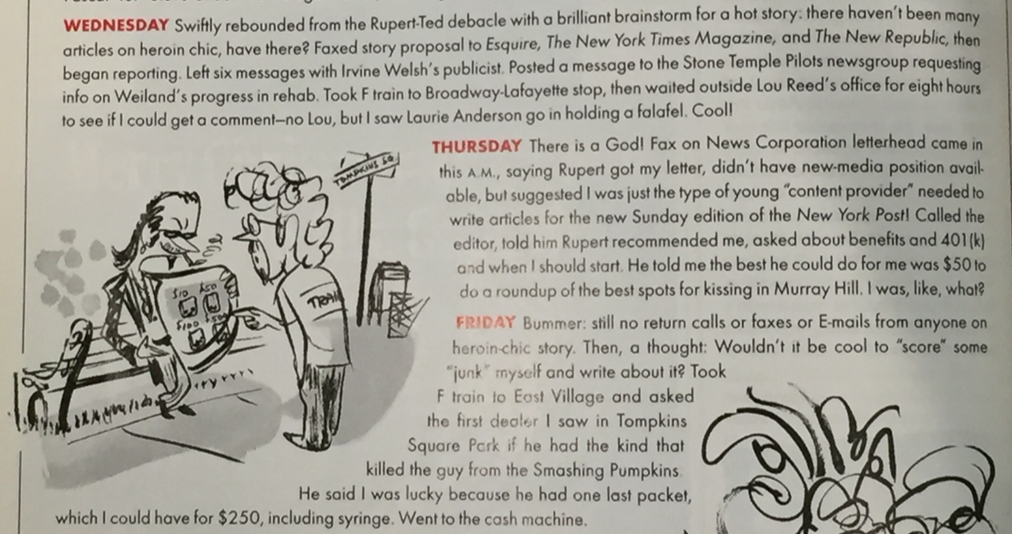
Josh Freelantzovitz’s lampoon diary was conceived by David Kamp who, as a young editor at GQ in the early-to-mid 1990s, was still learning the tools of the trade. Beside the queries from polite freelancers, Kamp dealt with a series of aspiring writers who “hadn’t read the magazines, who were pitching rather relentlessly, aggressively and rudely.” To overcome the boiling sense of frustration, he came up with a comic doodle outlining the weekly diary of one of those wannabe writers. He passed it to Graydon Carter as an inside joke. “It wasn’t meant for publication, it was just ‘familiar with this guy?’” Kamp recalled. “[Carter] just said “this is funny, let’s print it.” It ended up running from 1996 to 1999 (my index-based research, coupled with a Condé Nast librarian’s assistance, only yielded seven entries). Illustrator Tim Sheaffer gave him the look of a young Michael Chabon, minus his charm.
The diary, which detailed the weekly deeds of Freelantzovitz, usually contained an inane idea (e.g., a magazine called @water, a partnership request to Rupert Murdoch) followed by pitches (email Joe Dolce!!) usually facilitated by Josh’s friends, a rejection slip or an underwhelming assignment.

A feeble attempt at immersion journalism (sniffing heroin, stalking Lou Reed) would follow. The week usually ends in an underwhelming manner, with Josh getting food poisoning or reeling from the umpteenth rejection, which was usually the case after sending an editor he admired, say, a bag of prized coffee beans.
His sentences are pompous but with an underlying puppy-like enthusiasm, and his schemes to become famous or finally meet the executives of his dreams are as intricate and as childish as Wile E. Coyote’s ploys to tame the Road Runner. At one point, he planned a lawsuit against Woody Allen — “Clearly, he based the Kenneth Branagh character in Celebrity on me,” he wrote, “Leo must have told him about my abbreviated tenure in his posse.” The accompanying illustration featured him sleeping next to a defaced poster of Woody Allen.

Other writers, who were contemporaries of Kamp-as-Freelantzovitz had strong feelings towards the character. “Josh was the embodiment of naked, stupid ambition: All grasping and no talent,” said writer Matt Haber, who once equated Freelantovitz with Jacques Hyzagi (remember Elle on Earth?) with Freelantzovitz. “As a wannabe writer myself at the time, I was also a little insulted by Josh and his grabby, grubby machinations: His schemes to get into print were so much better than mine!”
Virginia Heffernan, in a 2010 review of the iPad version of Vanity Fair for the New York Times, recalled the adventures of Freelantzovitz as “horrific,” and “too close to home.” Heffernan used to read, cringe and laugh at the adventures of Josh Freelantzovitz with her then roommate and fellow writer Mike Albo. “In every letter (!) I wrote to the Village Voice or The New York Press I did feel like one of those 19th-century characters in maybe Balzac who has come to the city with his sheaf of poems and letter of introduction from a friend of his uncle’s,” she wrote in an e-mail. “The letters I wrote were so humble and even craven — I had of course studied every article in the Voice for 10 years and was prepared to praise every one of them as groundbreaking — and it was fun to see this as a citywide practice, even as I knew it wasn’t, beyond the small world of English majors dreaming of making $25,000/year at the Voice.”
For his art, Albo said he still thinks about how Josh Freelantzovitz was “as pathetic and desperate” as he was. “There must be something perennial about him, because I still scramble like he did, even in the age of our Freelance Isnt Free Act,” he wrote “Just two days ago in fact, I had to send one of those ‘My payment for TKTKKT is 90 days past due of the 90 day window you said you would pay. If I dont receive this payment by Friday I will contact my lawyer.’ And not only did I write that, but I had to have my LIFECOACH handhold me into composing and sending it IRL! No joke! I AM JF!!!”
Former Vanity Fair contributing editor Toby Young, in his memoir How to Lose Friends and Alienate People, recalls how he reacted to one Freelantzovitz sample with sanctimoniousness: “It was unseemly, I argued, to poke fun at people who were struggling to obtain the professional status that Vanity Fair’s contributors had achieved. […]The author of this piece, I said, holding up the offending article, is a snob, wanting to kick away the ladder that he himself has climbed so no one else can follow.”

Josh Freelantzovitz’s cover letters contained grandiose statements such as “I hold the key to the future” and “I am a visionary, I am uniquely qualified”; his pitches always came three to six months too late, meaning his topics of interest (heroin-chic, young people smoking cigars while listening to lounge music) had already been covered, and his unpublished fictional material consisted of cringeworthy titles such as The Gatsby of Wesleyan and Kolumbia Kounty, a potential indie-road-movie about a “handsome, but moody freelance writer” who goes on a crime spree in the Hudson Valley after his parents cut him off. The only writing assignments he managed to snag in the New York Post and Time Out New York were round ups on “The Best Kissing Spots in Murray Hill” and a listicle of the “Best Internet Cafes”.
Even though it was painfully clear that I was dealing with a piece of satire, I have to confess that my first thought, upon reading those old columns, was, “Haven’t we all, to some extent, been there, writing cover letters full of self-aggrandizing statements, being met with silence or polite passes from potential editors, having to resort to writing listings and round-ups?” Well, we have, but, I would learn from Kamp, the problem here is the attitude.
When I contacted Kamp to know more about the character, he told me that my reaching out to him was one of the most eccentric requests he ever got, and that Freelantzovitz, for him, was nowhere near the stereotypical rookie writer. “I was surprised because I never meant for him to be someone who was identifiable to the reader,” he said “He was meant to be a nuisance, an irritant, He wasn’t supposed to be the character you read about and go ‘oh, that’s me.’”
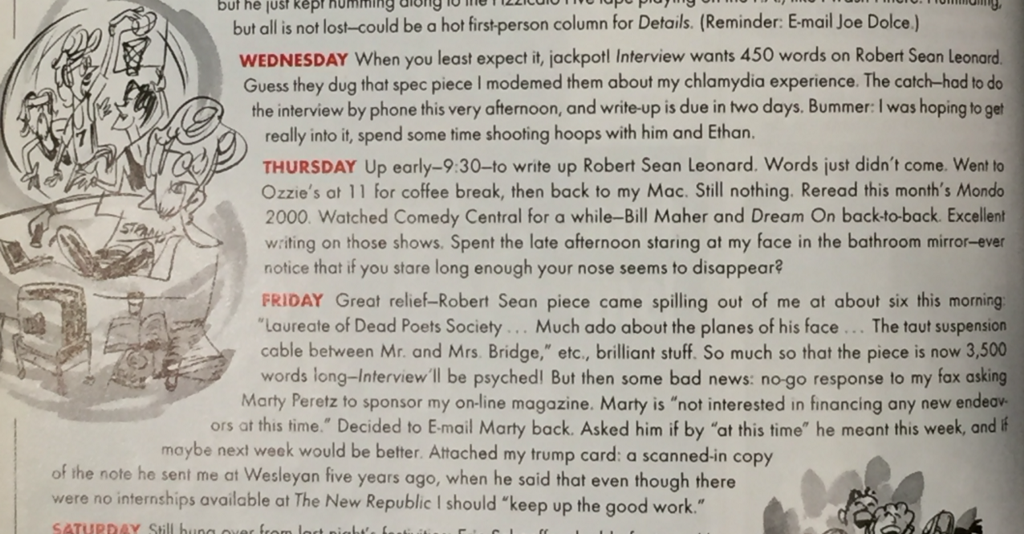
The lack of talent and dubious work ethic weren’t Freelantzovitz’s main tragic flaws, though. Entitlement was his crux. “He had the sense that the world owed him literary success, whether or not he had the talent for it,” Kamp explained. “He was meant to represent a particularly irritating breed of entitled writer, which still exists to this day. People who aren’t necessarily that good. They might be very driven, but they’re not that good.”
To Freelantzovitz’s meager defense, the magazine industry in the 1990s, without online outlets or editors that offer their contact information in their Twitter bio, was a much tougher battleground ground than it is today: it was harder to get your name into print, there were fewer outlets, there was not much internet to speak of, and email was not commonplace until the late 1990s, Kamp told me. Pitching consisted of sending query letters and then you would follow up by cold-calling the office: “The website offers more opportunities,” executive editor of GQ Devin Gordon told me, commenting on the limited real estate of his print publication. “But with each year, as the site grows, our expectations for the quality there are higher and higher as well.”
That the bar was so high was beyond Freelantzovitz, though: along with his brother Joel, who sporadically got his column too, “The Fabulous Freelantzovitz Boys,” detailing the toils of an aspiring Hollywood screenwriter who also had to remotely babysit his Brooklyn-based sibling, he was raised to believe he was a star. At one point, he pitches Norm Pearlstine — then at Time Warner — the idea of a new magazine named JOSH, a title that, allegedly, would “leave GQ, Esquire, Details and Men’s Journal in the dust,” thanks to a never-before-seen sex column he thought he had the authority to write based on an accepted condom review for Details (never published) and a quiz for Maxim (same).
“When I first came to New York, I met people who would be 22–24 years old and they were [all like] ‘the world is awaiting my talent,’” Kamp recalled. “It still amazes me that people come up that way. My idea was that Josh and Joel were those two guys who thought, ‘the world is waiting.’”
At some point, Josh Freelantzovitz specifically thought that the world was waiting for him to be the next James Wolcott. When vanityfair.com launched, Wolcott had a blog hosted on the site, and Kamp resurrected the character and made him some kind of stalker: without an inch of Wolcott’s talent, the best Freelantzovitz could do was troll him, posing as a media insider who could afford to be dismissive of Wolcott’s work. “Graphix cool, but Wolcott blog jejeune [sic] and pedantic;” he wrote in the Forums (unfortunately no longer available, but thanks Baltimore’s Finest Trash for copying these comments.) “I’d do it much better if only they’d let me. Still, a site to keep an eye on, my friends”
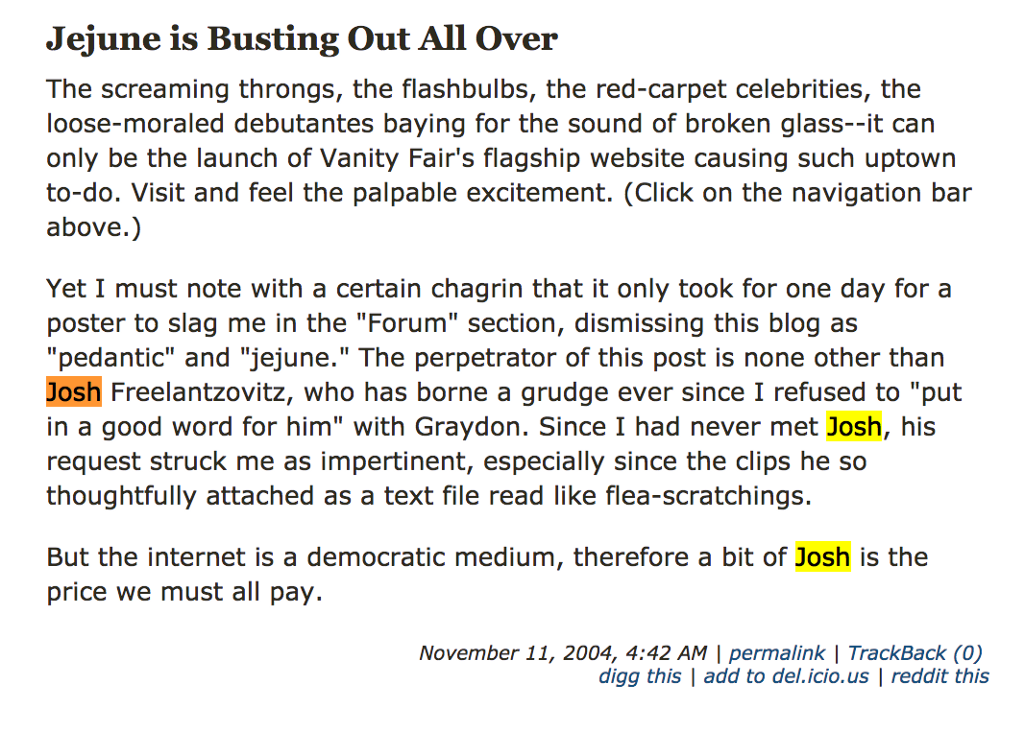
Despite Freelantzovitz’s awful personality and incompetence, though, Kamp decided to give him a relatively bright future. First he had him relocate to Flushing because he got cut off by his wealthy parents based in Brookline, MA. Kamp saw the move as a hopeful sign of resourcefulness in his character; a couple of years later, Josh and Joel Freelantzovitz co-founded Brookline Boys, a company that manages the production company “Sack O’Coaster”, and, here and there, they sold pilots to the likes of HBO. “Experience has taught me that certain people succeed due to relentlessness rather than kindness or talent, and people like that tend to find some niche,” Kamp said. “That type of person does eventually find some foothold somewhere. Through pure relentlessness, they’re failing upwards”.
What if he had persisted with his journalistic ambitions, though? I would picture him as a staff writer for one of those content mills: there, he would try to elevate his aggregated-news posts with some obscure, or pathetic, cultural references in the attempt to sound smart, in the hope that he would be offered to publish an essay in, say, an n+1 anthology. His 23-year-old boss would rein in his flights of fancy. Haber had an even better idea: he’d be an enthusiastic retweeter, an inveterate link-sharer, a new platform early adopter, and an obsessive Facebook friender “He’d tweet things like If I still did stuff for @nymag I could write 4k words on #covfefe,” Haber speculated. It makes complete sense.
Some Are Reading
Books may be the last best distraction.
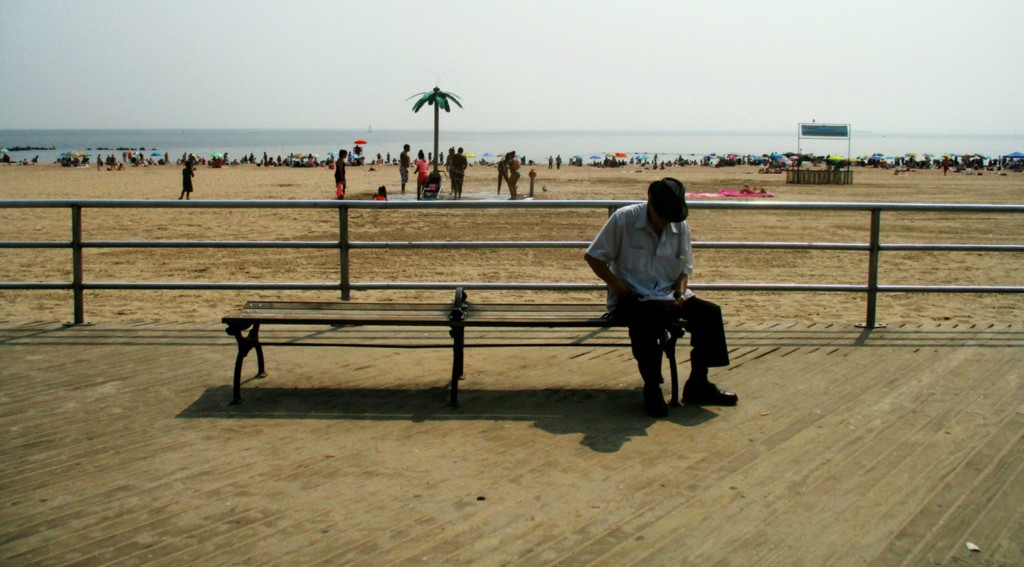
Whatcha readin’ this summer, anything good? Have you realized yet how much better it is to disappear into the book of your choice instead of being aware of what is happening in what we are still calling “the real world” even though everything about it is offensively surreal? Are you looking for something to take you away? Here are few things that I have enjoyed that you could check out:
Pond, by Claire-Louise Bennett: Now in paperback! I have been telling you to read this for a while and now you have no excuse. “It’s not a beach book per se, but it is perfect for now because you can read it in a night or dip into it as time allows; the brevity of the chapters give you the space to take as much as you want depending on your mood,” is what I said last year and, as always, I was right.
Pond by Claire-Louise Bennett | PenguinRandomHouse.com
Family Lexicon, by Natalia Ginzburg: Jenny McPhee’s new translation of this Italian classic is, naturally, from the folks at NYRB Classics, who are clearly overestimating how intelligent people are these days based on everything else that is happening in the world, but thank God that someone is. Anyway, the book is “a masterpiece” which “ recalls the great modernists’ reimaginings of childhood” and just shy of 200 pages, which should help to assuage any doubts you might have about taking a chance.
The Dog’s Last Walk (and Other Pieces), by Howard Jacobson: I am of the opinion that Jacobson is the funniest British man writing words right now, so this second collection of pieces from his column in the Independent (R.I.P.) is almost perfectly designed for me, particularly in our age of diminished attention spans. This is a great dipping-in-and-out book to have around, especially if you’re able to tear yourself away from your phone for a couple of minutes at a time.
While I have you here it is very important that I mention the two best books I have read this year: Bettany Hughes’ Istanbul: A Tale of Three Cities and Kapka Kassabova’s Border: A Journey to the Edge of Europe (which may very well be my favorite book of the decade). If I am still around I will tell you more about them closer to when they come out but you should pre-order them now so that if you are still around you will be surprised and delighted when they arrive, because either way I am pretty sure you will still need to disappear into books at that point.
Anyway, these are my suggestions. What are yours? Please tell me on social media, because social media is TERRIBLE right now and people talking about what books they’ve enjoyed is the only way it could get better. Thanks.
Doesn't This "Great British Bake Off" Contestant Look Like Joaquin Phoenix?
He does!
Are you watching this season of “Great British Bake Off” that’s airing on PBS right now? (Or, as it’s known in America, “Great British Baking Show.” Why PBS thinks we can’t deal with the word “off,” I’ll never know.) Anyway, you really should be watching. Here’s a good reason to: this guy named Tom.
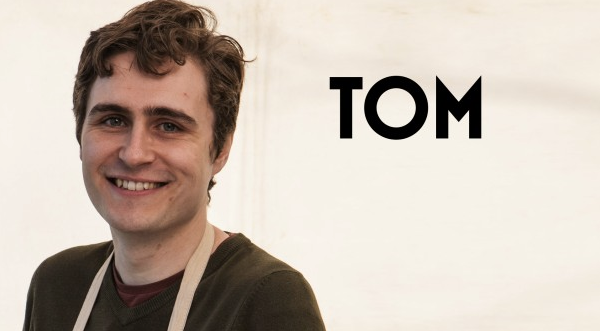
Doesn’t he look nice? The deal with Tom is: he’s a normal guy with a normal job and a wife. That’s always the deal with a lot of the men on “Great British Bake Off.” They’re nice and affable. I mean, they’re men who are home bakers, so they can’t be uniformly awful the way so many men often can be. Remember Howard, who was cute and liked painting? And Norman, who was Scottish?
Now there’s Tom. Tom is lovely. Want to know some things he’s baked? Okay, well, how about a gin and tonic drizzle cake? Very cool. What about a loaf of bread themed after… uh, Norse mythology? Lame but also cool.
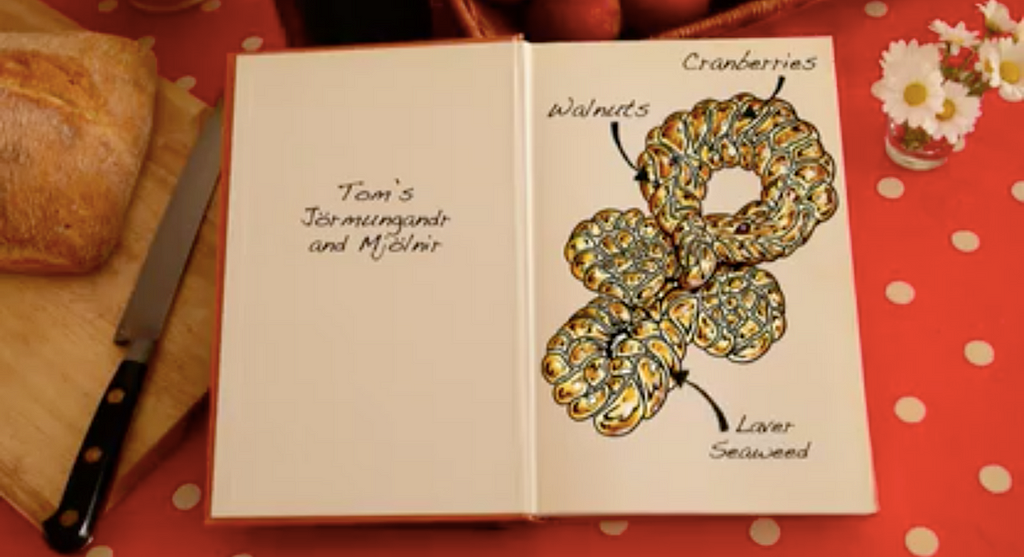
Here’s another thing: doesn’t he kind of look like Joaquin Phoenix? Not modern-day Joaquin Phoenix, who looks ridiculous, but Joaquin Phoenix from around the time he was in Gladiator.

This is an old version of Joaquin Phoenix giving a thumbs up to Tom, who is good at baking and also nice.
Let’s look at Tom again.
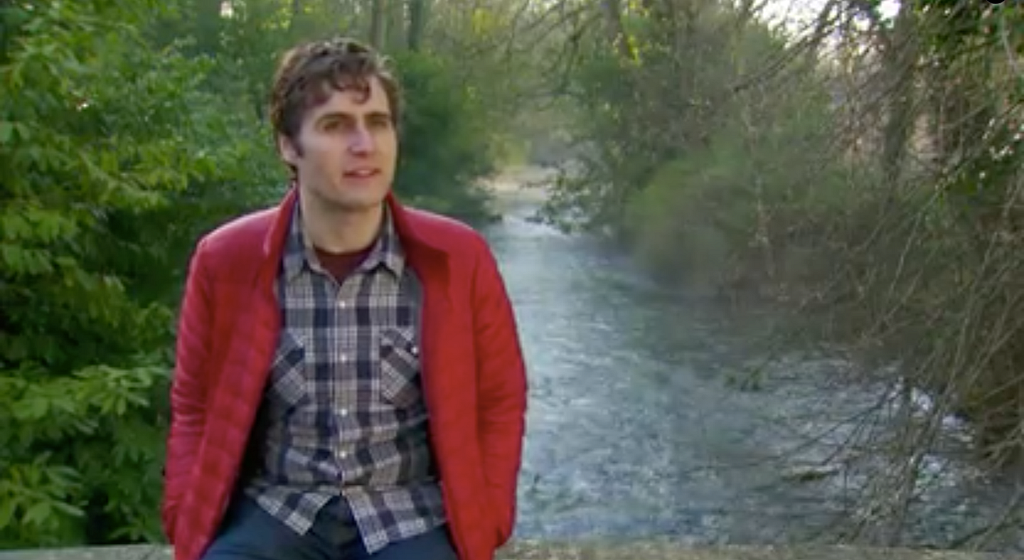
Look at Tom’s nice red jacket!!! It’s so nice!!!!!!!!!!!!!!!!
Here’s the thing, I don’t like Joaquin Phoenix very much because his entire vibe is alienating and strange to me and maybe his best movie is Signs? And also I have never watched Gladiator of my own volition because for about a decade of my life, it was just a movie that boys who were two years older than me always insisted on showing me. (It’s fine.) (The score is good.)
And I like Tom (the guy from above who looks like Joaquin Phoenix) very much because he has kind eyes!! And “Great British Bake Off” is a lot better than Gladiator because I get to watch nice people make food I would eat, and it’s also sort of a fun game of fancasting who would be your new friend. My new friend is Tom, and he can be yours, too.
Fran Hoepfner is a writer living in Chicago.
Respect The Bear And It Will Respect You Back
“teen-camper-wakes-up-to-crunching-noise-and-discovers-his-head-is-inside-bears-mouth” is a great URL
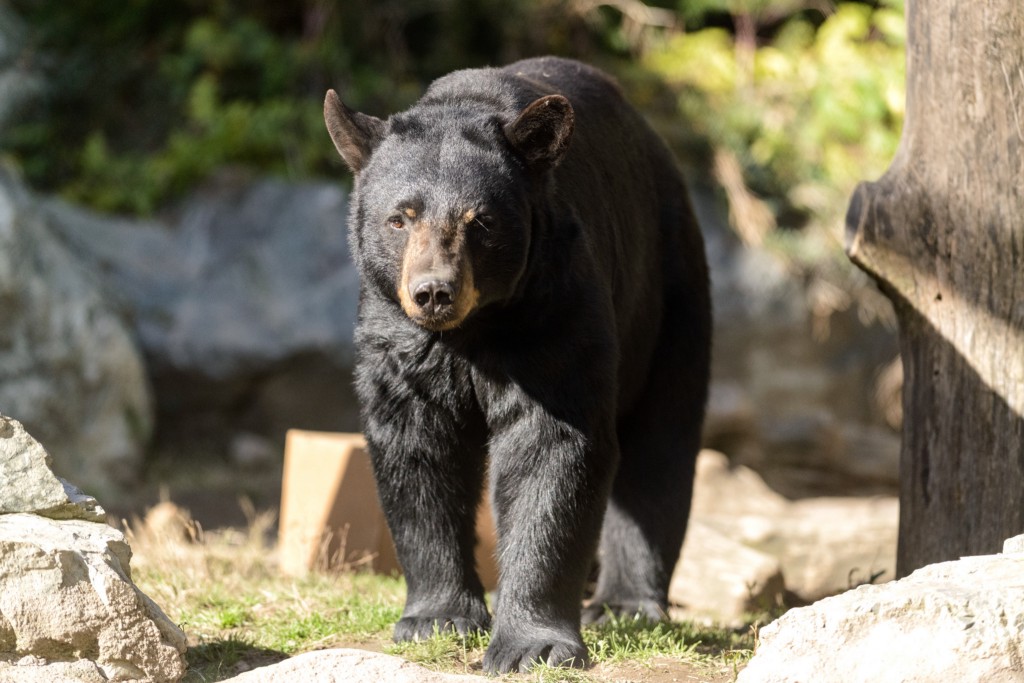
A nineteen-year camp counselor woke up this weekend with his head inside of a bear’s mouth, and no that is NOT a euphemism for a hangover; it was a Seventh-day Adventist summer camp, where the kids go canoeing and ziplining “all in a safe, Christ-centered atmosphere.”
Teen camper wakes up to ‘crunching noise’ – and discovers his head is inside bear’s mouth
Dylan (he was only identified by his first name) described waking up to a crunching noise (presumably teeth against skull) and being pulled out from his sleeping bag and then dragged about ten feet by the back of his neck. Then the bear just left him and walked away! Dylan’s secret? He respects the animals.
It doesn’t sound like the bear wanted to eat him really, because if it wanted to it could have. Maybe the bear sensed Dylan’s respect, and respected him back. Maybe the bear was sleepwalking, and thought it was saving a teen from a fire. Maybe the bear was lonely and wanted a plaything. Sounds like a classic case of bear ennui, also known as the founding principle of The Awl. Awl co-founder Alex Balk had this to say:
balk [12:00 PM]
oh my god those scars are gonna get that kid so laid
Kids Are Great If You Hate Money and Sleep
And other answers to unsolicited questions.
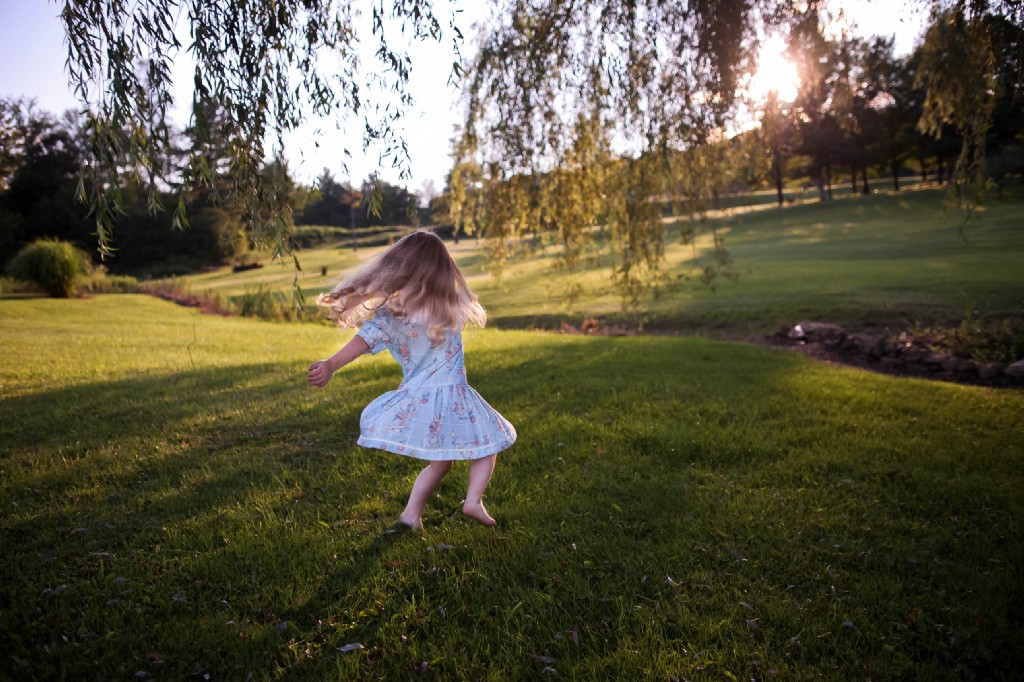
“We’re thinking of having a kid. What do you think?” — Childless Chris
Other people’s kids are great. Kids are funny and often amusing. They sometimes do tricks. When I go to barbecues, I hang out with the kids and play wiffle ball and soccer for hours. I don’t understand why adults just stand around at these things drinking beers and watching kids when you can just be dominating kids, dunking on their heads, hitting grand slams, whatever. And they love it. Even when I do go get a beer they’ll come drag me back to once again hit a wiffle ball into someone else’s yard for them. The best thing about other people’s kids is that you can give them back and someone else has to deal with their inhalers or Klonopin or whatever. My job is merely to be Crazy Uncle Jim.
I’ve never particularly wanted children. I’m not alone. The US birth rate is at an all-time low. Teenagers and people in their 20s are having children at a much lower rate than ever before. At some point we probably won’t have enough people in the workforce to pay for my social security checks. But I’ll hopefully be delirious by then and won’t be able to tell the difference. I got 25 more years in the bookstore to look forward to. Will we still have books in 25 years? That’s probably when the next Game of Thrones book will be out. Just as I’ll be too blind to read it. Thanks, George R. R. Martin!
I can respect that millennials are having fewer kids. Finally, a generation has wised up! Kids are expensive and they always break your cool stuff. If I could have lived in my parents’ basement and goofed off my whole life, I definitely would have done that. I would do that now! Get ready, Ma and Pa Behrle! Responsibility is seriously overrated and whether the US has enough people to replace the amount of crappy people we have now is somehow my problem is seriously questionable.
Relationships are harrowing enough on their own. There are very few situations in life that you’ll think to yourself “This would be going way better if there was also a screaming baby here. If it were up to me screaming babies would be banned from everywhere like cigarettes. Life is short and your howling, uncontrollable child was not in my brochure. So no kids in restaurants, subways or planes, either. Fly Parent Airlines. Or designate part of the Cargo section of planes for families.
I feel bad for parents trying to deal with their wild tots, but I think if we just build “parent towns” across our great nation, it will make things better for us all. As cool as you think it is to bring your baby up in the city, sooner or later you’ll go broke and move to Topeka anyway. Because kids are expensive. They need pants all the time. And wipes so you can clean up their vomit. And you can’t even make them work in a coal mine or a sweat shop anymore. Shouldn’t we allow the free market to decide whether little kid hands are better at most professional tasks than big adult ones?
So, build cities for parents to live in with their kids that’s far away from New York, Chicago and LA. No one wants to deal with you dealing with your kid in public. Kids ruin lots of great things, like dirty television shows. We have to not swear on songs or shows because kids might hear them or something. I love to swear! It’s one of my very favorite things! Move out to the middle of Iowa with your rugrats and husk corn, vote for Republicans, whatever. Just do it someplace where I won’t have to hear them crying all the time.
In general life is kind of a bullshit deal. You think your life gets to be about you and what you want to do with it. They literally tell you to dream high and imagine that anything is possible. But then you accidentally fall in love with the wrong person, marry them, have a bunch of bad babies, and your life is officially over. You know have to suffer through the insufferable everyday to provide for others, hoping only to someday feel happy when you start dating the nanny.
So, sure, maybe have a kid. There’s plenty of kids that are already on Earth and need your help and possibly to be adopted. But it doesn’t matter if you do or don’t. I kind of like the movie Children of Men where there’s no screaming babies in restaurants. Everyone’s infertile and British. It seems like a nice enough world. Humanity is just about to die off, which would probably be fine for the rest of the universe. So, whatever, have a kid. Just don’t think that it makes you special. The only requirement to have a kid is to get laid like once. Anyone can do that. Just go with me to the prom.
Jim Behrle lives in Jersey City, NJ and works in a bookstore.
